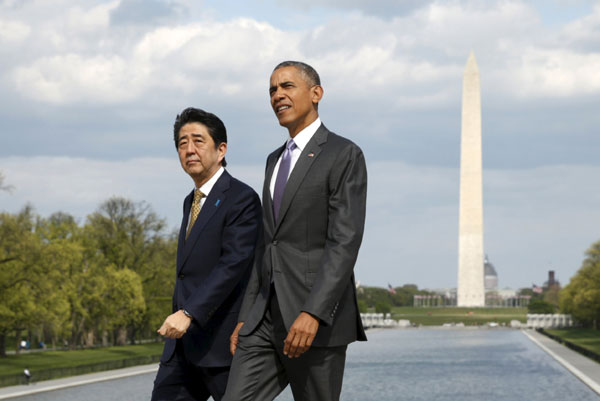|
 |
|
US President Barack Obama and Japanese Prime Minister Shinzo Abe visit the Lincoln Memorial in Washington, with Washington Monument in the background April 27, 2015. Abe is on a week-long visit to the US. [Photo/Agencies] |
Commemorating the 70th anniversary of the end of World War II in the Pacific on Sept 2, US President Barack Obama touted the relationship between the United States and Japan over the past 70 years as a model of the power of reconciliation.
This is an overstatement, for the whole world knows the US-Japan alliance, a legacy of the Cold War, is dominated by Washington and could not possibly be seen as a good example of international relations. This is especially true at a time when global calls for the democratization of international relations are rising.
But Obama was right when he said the US-Japan relationship today is a fitting reflection of their shared interests, capabilities and values. Indeed, the trajectory of interaction between the WWII foes over the past 70 years is a model in which each takes what it needs and each uses the other for its own ends.
After WWII, the US and Japan did reconcile, and the US deemed its occupation of Japan a necessary step to guarantee that the latter never posed a threat to it. But with the onset of the Cold War, Washington adjusted its policy toward Tokyo and changed confinement into systematic fostering.
To rise from the rubble of war, Japan sacrificed part of its sovereignty to sign a crucial security treaty with the US, which laid the foundation of the US-Japan alliance. Since then, the US has used Japan as an important piece on its chessboard to project its power in the Asia-Pacific region.
When the Obama administration implemented its "rebalancing to Asia" strategy to contain the rise of regional powers, including China and India, it strengthened its military cooperation with Japan to have a bigger US presence in the region.
Since Japan has never truly owned up to its history of aggression and Japanese Prime Minister Shinzo Abe's government is walking the revisionist road to push Japan further away from its pacifist Constitution, the US-Japan alliance is being used by Tokyo to stick to its wrong perception of history.
Japan's unrepentant attitude toward history has led to rising disputes with its neighbors, China and the Republic of Korea in particular. And if Abe's rightist moves are allowed to continue, they will eventually hurt US interests.
Abe's ultimate goal is to make Japan a "normal" country, which can be achieved only by discarding its pacifist Constitution and overturning the US-initiated postwar world order. If that happens, the US should not be surprised to hear Japan asking its troops to leave the country.
In fact, US troops and military bases in Japan have become eyesores for many Japanese in recent years. Accidents and scandals have plagued US troops in Japan, evoking public indignation.
Last month alone, at least two accidents were reported from US bases in Japan. On Aug 12, an American UH-60 Blackhawk helicopter crashed while attempting to land on a vessel off the east coast of the Japanese island of Okinawa, which is home to four US military bases and training centers. On Aug 24, multiple mysterious explosions caused a large fire at a US Army depot in a Tokyo suburb.
Since two US Marines and a US Navy corpsman kidnapped and raped a 12-year-old girl in September 1995, Japanese people, especially Okinawans, have staged many protests demanding the US close the Futenma Air Base in Okinawa.
To some extent, the Futenma dispute is a wedge in US-Japan relations. With Japan's desire to become more assertive in regional and international affairs, skirmishes over Futenma could only intensify.
Asia-Pacific is the engine of the world economy today. Given these facts, as a country which has reiterated time and again that it has a stake in peace and stability in the region, the US could set an example by reining in the revisionist Abe government.
The author is a senior writer with China Daily. wanghui@chinadaily.com.cn